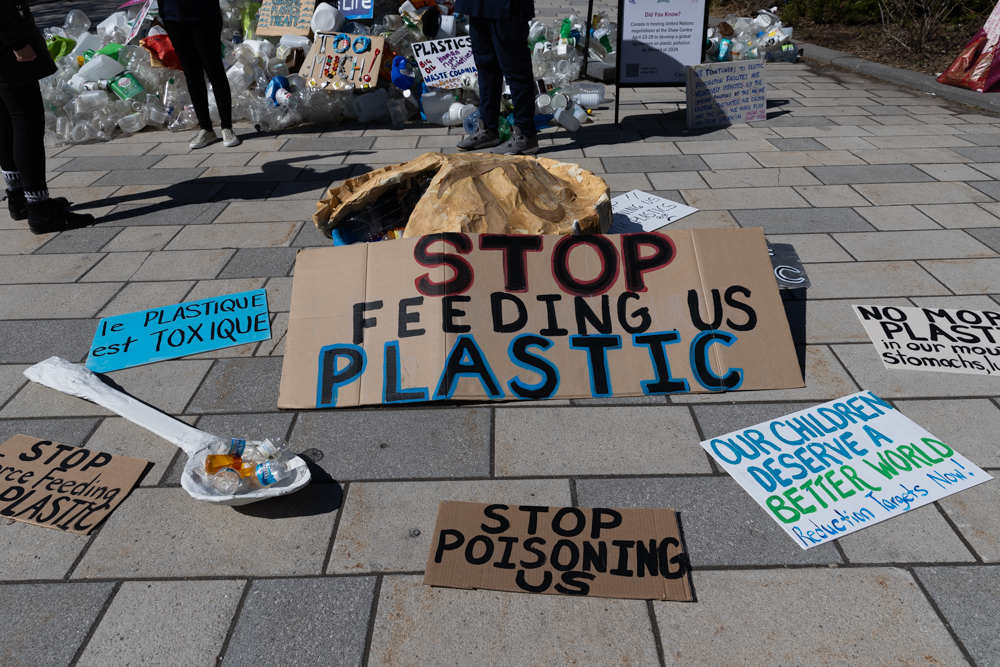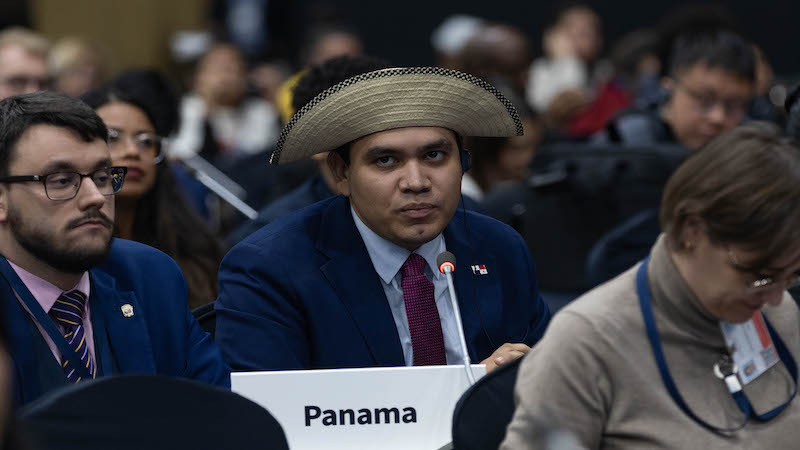As talks on a new global treaty to end plastic pollution approach the halfway mark in Busan, South Korea, countries clashed in a heated plenary session on Wednesday over the lack of significant progress so far on the core elements of a pact, including potential curbs on plastic production.
Several nations pushing for an ambitious agreement have complained vehemently over the slow pace of the negotiations, with diplomats accusing some of their counterparts of holding up discussions and failing to act in good faith.
While not naming countries directly, negotiators and observers told Climate Home that some fossil-fuel producing nations – led by Saudi Arabia, Russia and Iran – have repeatedly stalled the talks. These countries do not want the treaty to include any provisions on plastic manufacturing, preferring a narrow focus on managing consumption and waste.
At Wednesday’s plenary, Colombia’s negotiator said “a number of parties seem to be delaying discussions”, echoed by Switzerland’s delegate who said “some are not engaging in constructive dialogue”.
Juan Carlos Monterrey Gomez, Panama’s special representative for climate change, received loud applause after accusing negotiators of “tiptoeing around the truth and sidestepping ambition”.
“We are signing a pact of destruction for our planet and our people” if the treaty isn’t strong, added the fiery orator who wears a traditional hat.
The fossil fuel-producing nations in the firing line hit back at the accusations.
Iran’s negotiator said “we are sincere, we are honest and ready to cooperate”, adding that Tehran does “not want to be blamed for blocking negotiations through dirty tactics”.
Russia’s representative called the accusations “unacceptable”, while the Saudi government delegate cryptically raised the risk of unspecified “irregularities or ambiguities” and “text being parachuted into the process”.
Three days into what is due to be the final round of talks – and two and half years after the whole process started – government diplomats have yet to agree on any parts of the text aimed at dealing with plastic pollution across the “full lifecycle” of the material – which means from production to disposal and reuse or recycling.
Production curbs needed for strong global pact on plastic pollution, campaigners say
Before negotiators vented their frustration on Wednesday evening, the chair of the talks, Luisa Vayas Valdivieso had told them “time is of the essence”.
“Progress has been too slow – we need to speed up our work,” he added, before urging diplomats to keep their interventions short and get back to work.
Commenting on the state of play in the negotiations, Aleksandar Rankovic, director of think-tank The Common Initiative, told Climate Home “the process is near explosion”.
“Given the visible tensions during the plenary tonight, it is hard to see how consensus can be reached this week,” he added.
When Climate Home asked Inger Andersen, executive director of the UN Environment Programme which is shepherding the talks, if they were reaching breaking point, she categorically denied that was the case.
“It is not uncommon that language gets a little sharper at certain points, but these are all very experienced negotiators and all understand the minuet that is being danced here,” she said.
Battle over production curbs
The inclusion of provisions aimed at cutting plastic production remains one of the biggest sticking points in the negotiations.
A large coalition of countries – including most Western, African, Latin American and Pacific island nations – are determined that the treaty should mention putting limits on plastic manufacturing. That is the only way to make a real dent in plastic pollution, they argue.
A proposal submitted by Pacific small island developing states this week called for the UN treaty to include a “global target of 40 percent reduction [in plastic production] by 2040, compared to 2025 levels”.
On Wednesday, a group of 45 African nations – excluding South Africa and North African states – put on the table a less specific proposal for a “global target to reduce the production and consumption of primary plastic polymers to sustainable levels”.
A European negotiator told Climate Home that a “high level provision” calling for countries to “strive towards sustainable levels of production and consumption” could be more achievable.
“Ambitious countries will need to make a difficult decision on whether to take a less than ideal text or walk away from negotiations with nothing and no real alternative,” they added.
Plastic production has been rising at an unrelenting pace over the last few decades and, according to some projections, it could double or triple by 2050.
As nearly all plastic is derived from fossil fuels, a surge in production is expected to have a significant impact on the greenhouse gas emissions exacerbating the climate crisis.
Plastic production could consume around a quarter of the carbon budget remaining if global warming is to be limited to 1.5C above pre-industrial levels, according to a study by the US-based Lawrence Berkeley National Laboratory.
But many producers of fossil fuels see the petrochemicals sector, including plastics, as a lifeline with demand for oil and gas in the energy sector projected to decline as the world shifts to cleaner sources.
In submissions made this week, Saudi Arabia, Russia and Iran reinforced their view that production curbs fall outside the scope of the treaty, raising the prospect of “economic disruption”, trade restrictions and shortages of essential materials if such measures were enacted.
Christina Dixon, ocean campaign leader at the Environmental Investigation Agency, told Climate Home that “the talks hang in the balance” after Wednesday’s plenary.
“We have a once-in-a-generation opportunity to secure a meaningful deal capable of addressing plastic pollution – but as usual a small minority of oil-producing countries are intent on derailing progress,” she added.
Dixon called on ambitious states to “hold firm”, while also making concerted efforts to offer a “financial package capable of delivering the change we need”.
After the plenary showdown, closed-door negotiations resumed with an official deadline of Friday night for agreed text to be handed over to legal reviewers before final approval.
“I won’t be holding my breath over that,” one veteran observer told Climate Home.
(Reporting by Matteo Civillini; editing by Megan Rowling)

